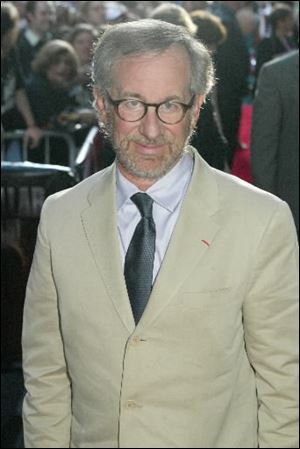
Moviemaker Spielberg tells about his career in TCM show
7/9/2007
Steven Spielberg says Jaws became a stronger movie because the mechanical shark didn t work.
If a high school kid with stars in his eyes hadn't hidden out in a restroom stall some 40 years ago, moviegoers might never have had the chance to make the acquaintance of such movie icons as Indiana Jones and E.T. - not to mention the scariest great white shark ever to terrorize the eastern seaboard.
That wide-eyed teenager was Steven Spielberg, and in a thoroughly enjoyable documentary on Turner Classic Movies at 8 tonight, the famous film director shares the fascinating story of his career and talks about the movies that helped catapult him to the top of his profession.
In the 90-minute program, called Spielberg on Spielberg, the director's recollections and musings are interspersed with clips from several of his blockbuster films, from Jaws and Close Encounters of the Third Kind through Raiders of the Lost Ark, E.T. the Extra-Terrestrial, and The Color Purple, to Jurassic Park, Schindler's List, and Saving Private Ryan.
Hearing Spielberg speak candidly about his movies is a treat, and a rare one at that, because, unlike most Hollywood directors, he's never made an audio commentary to accompany the DVD releases of any of his films.
But back to that restroom. It was in the early 1960s, during a tour of Hollywood's Universal Studios, when the teenaged Spielberg took a bathroom break, then simply stayed there until the tour group had moved on.
"When I came out a half hour later, I was free," he recalls. "I was on the Universal Studios lot! I had no idea how I'd get home, but I spent the whole afternoon just walking in and out of doors, sound stages, and cutting rooms. I took my own tour and had an amazing time."
Along the way he encountered a friendly film librarian who, amused by Spielberg's boldness, gave him a three-day studio pass, which the young man parlayed into a whole summer on the Universal lot.
A few years later, by then a college student, Spielberg made a 24-minute film called Amblin'. Based on that movie, and on the contacts he'd made at Universal, the young filmmaker was signed by the studio to a seven-year contract as a television director.
His TV debut was directing a segment of Night Gallery, in which the 22-year-old worked with film legend Joan Crawford. Soon after that, he made his first feature-length TV movie, a tautly suspenseful story called Duel, which became something of a classic and established its director as a talent worthy of theatrical films.
One of Spielberg's first big-screen projects was a little thing called Jaws (1975), which came to define the term "movie blockbuster." And to hear him tell it, part of the film's enormous success was due to a technical glitch early in the filming process. The mechanical shark being used in the movie malfunctioned and sank to the ocean floor on the first day of shooting, so the young director was forced to improvise, merely suggesting the shark's presence in subsequent scenes, and not often showing it.
"The shark not working when we needed it to work probably added $175 million to the box office," Spielberg says, "because I think what's scary about that movie is the unseen, not exactly what we see."
A string of hit movies followed, including E.T. ("the most spiritual movie I ever made"), The Color Purple ("my first grown-up film"), Schindler's List ("the most important film I've ever made"), Saving Private Ryan ("a tribute to my dad"), and Munich ("the most controversial film I've ever been involved with").
There was also the occasional misfire; the comedy 1941 was panned by critics and largely ignored by audiences.
The documentary includes lots of tidbits that will be of interest to movie fans. For instance, the brutally graphic opening sequence of Saving Private Ryan, which left audiences slack-jawed, was entirely improvised. "It took four weeks to shoot what became 26 minutes of film," Spielberg recalls.
He also describes an unusual deal he made in 1977 with close friend George Lucas, creator of the Star Wars franchise. Lucas, who had just finished work on the first Star Wars movie, was visiting Spielberg on the set of his project, Close Encounters of the Third Kind. Convinced that Close Encounters would do a killer box office and Star Wars might not, Lucas suggested to his friend that they trade each other a percentage of the gross receipts from their respective movies. Spielberg agreed.
"I think I came out on top of that bet," Spielberg laughs, alluding to Star Wars position as one of the top-grossing movies of all time. Even today, the money from Star Wars is still rolling in, he adds.
Just as much fun as Spielberg's insights are the many scenes from his movies, which may just prompt viewers to drive to their local Blockbuster or go online to Netflix and rent a few of them that they haven't seen for a while.
But there are at least two they won't have to rent. Following the documentary, TCM will present Jaws (9:30 p.m.) and Close Encounters of the Third Kind (1:30 a.m.).